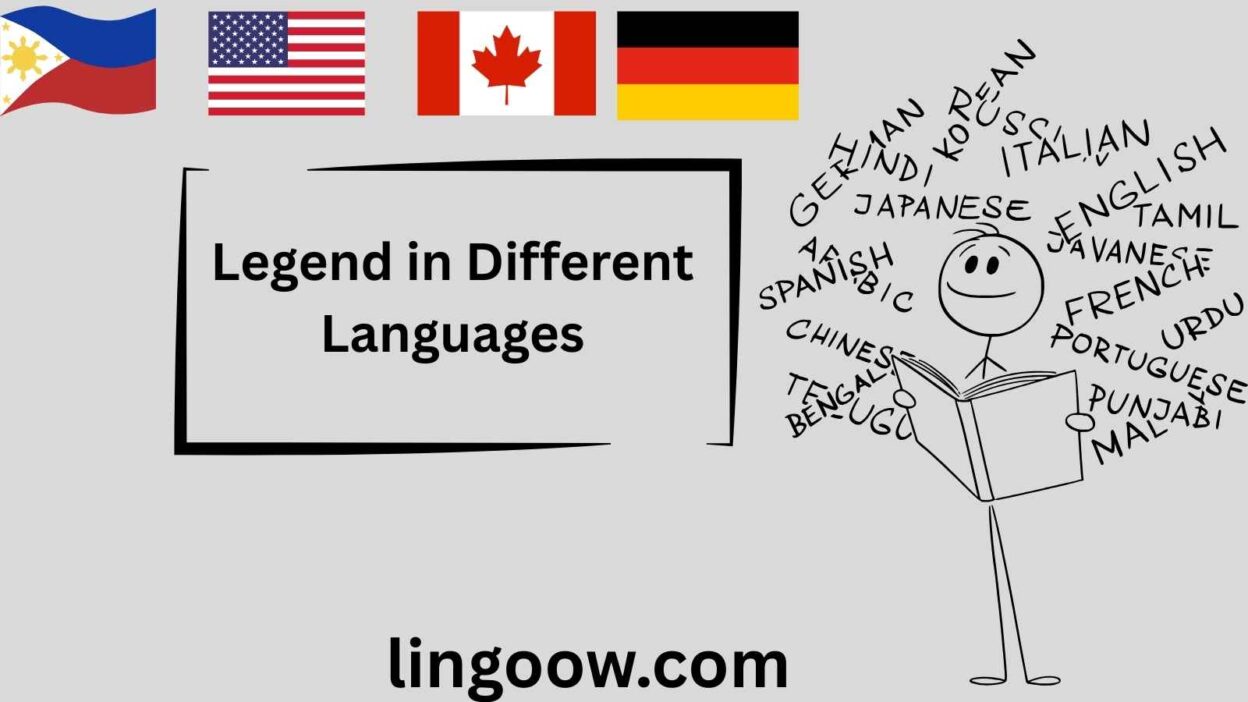When I was a child, my grandmother would sit me by the fire, her eyes gleaming with the weight of stories passed down through generations. She’d tell me tales of heroes, mythical creatures, and deeds so grand they seemed to defy time itself. “These are legends,” she’d say, her voice soft yet commanding, “stories that live forever.
” That word—legend—struck a chord in me. It wasn’t just a story; it was a bridge connecting hearts, cultures, and eras. Across the world, the concept of a legend transcends borders, weaving itself into the fabric of every society. Whether whispered in a village or celebrated in epic poetry, legends are the heartbeat of human history, uniting us in our shared need to dream, remember, and inspire.
In this journey, we’ll explore how the word “legend” is expressed in different languages and cultures, uncovering the unique flavors each brings to this universal idea. From European castles to African savannas, Asian temples to island shores, the word carries a weight that reflects both local traditions and a shared human spirit.
Reference Table: The Word “Legend” Across Languages
| Language | Word/Phrase for “Legend” | Cultural/Linguistic Insight |
| French | Légende | Rooted in medieval tales of saints and heroes, often tied to oral storytelling. |
| Spanish | Leyenda | Evokes epic tales like those of El Cid, blending history and myth. |
| Italian | Leggenda | Associated with romanticized stories of Roman gods and Renaissance heroes. |
| German | Legende | Often linked to folklore, like the tales of the Brothers Grimm. |
| Mandarin | 传说 (Chuánshuō) | Literally “passed-down tale,” emphasizing oral tradition in Chinese culture. |
| Hindi | किंवदंती (Kinvadanti) | Tied to epic narratives like the Mahabharata, rich with moral lessons. |
| Japanese | 伝説 (Densetsu) | Often linked to Shinto myths or samurai tales, revered for their spiritual depth. |
| Korean | 전설 (Jeonseol) | Connected to folklore like the tale of Dangun, Korea’s mythical founder. |
| Arabic | أسطورة (Ustūra) | Rooted in pre-Islamic poetry and tales of djinn, reflecting a mystical heritage. |
| Swahili | Hadithi | Means “story” but often used for legendary tales, central to East African oral culture. |
| Zulu | Inganekwane | Refers to folktales, often shared to teach moral lessons in Zulu communities. |
| Yoruba | Ìtàn | Encompasses legendary histories, deeply tied to Yoruba spiritual traditions. |
| Maori | Pūrākau | Sacred stories of ancestors and gods, integral to Maori identity. |
| Hawaiian | Kaʻao | Refers to legendary tales, often tied to Polynesian gods like Maui. |
| Cherokee | Sgałi | Legends tied to nature and spirituality, passed down through oral tradition. |
European Languages: Tales of Knights and Poets
In Europe, the word “legend” conjures images of knights, castles, and ancient manuscripts. In French, légende hails from the Latin legenda, meaning “things to be read.” It’s tied to medieval hagiographies—stories of saints whose lives blurred the line between fact and myth. The French cherish their légendes, from Joan of Arc to the mystical tales of Brittany’s forests, where folklore thrives.
In Spanish, leyenda carries a similar weight, often evoking the romanticized tales of conquistadors or the tragic love story of Don Juan. Spanish-speaking cultures weave history and myth seamlessly, as seen in the leyendas of Latin America, like Mexico’s La Llorona, a ghostly figure rooted in colonial pain.
Italian leggenda is steeped in the grandeur of Rome and the Renaissance. Italians use it to describe both ancient myths, like Romulus and Remus, and modern icons like Federico Fellini, whose cinematic brilliance is legendary. Meanwhile, in German, Legende is grounded in the Brothers Grimm’s fairy tales, where forests are alive with magic and moral lessons. Each European language frames “legend” as a story that shapes identity, whether through heroism, tragedy, or wonder.
Asian Languages: Myths That Shape Civilizations
Asia’s vast linguistic diversity offers a kaleidoscope of interpretations for “legend.” In Mandarin, chuánshuō (传说) translates to “tale passed down,” reflecting China’s reverence for oral history. From the legend of the Monkey King to the Great Wall’s origins, chuánshuō carries the weight of a 5,000-year-old civilization. In countries like Taiwan and Singapore, the term is used similarly, often tied to Confucian values of legacy.
In Hindi, kinvadanti (किंवदंती) is synonymous with epic narratives like the Ramayana, where gods and mortals intertwine. Across India’s 20+ states, from Punjab to Tamil Nadu, kinvadanti reflects local folklore, like Rajasthan’s tales of warrior kings. Japanese densetsu (伝説) evokes samurai epics and Shinto myths, such as the legend of Amaterasu, the sun goddess. In Japan, densetsu is a term of reverence, used for both ancient tales and modern icons like baseball legend Ichiro Suzuki.
Korean jeonseol (전설) is deeply tied to national identity, with stories like the founding of Korea by Dangun, a bear-turned-human. Across South Korea and North Korea, jeonseol is a source of pride. In Arabic, spoken across 20+ countries like Egypt, Saudi Arabia, and Morocco, ustūra (أسطورة) carries a mystical air, rooted in pre-Islamic poetry and tales of djinn. From Yemen to Algeria, ustūra reflects a shared Arab heritage of storytelling under starry desert skies.
African Languages: Stories That Bind Communities
Africa’s linguistic tapestry is as diverse as its landscapes, and the concept of “legend” resonates deeply. In Swahili, spoken in 12 countries like Kenya, Tanzania, and Uganda, hadithi means both “story” and “legend.” Swahili legends, like the tale of Fumo Liyongo, a heroic poet-warrior, are shared in communal gatherings, reinforcing unity.
In Zulu, spoken in South Africa and parts of Eswatini, inganekwane refers to folktales that carry moral weight. Stories of trickster animals or ancestral heroes are told to children, preserving Zulu values. Yoruba, spoken in Nigeria, Benin, and Togo, uses ìtàn for legendary histories, often tied to the Orishas, divine spirits who shape Yoruba cosmology. Across 20+ African nations, from Ethiopia’s Amharic tarik to Ghana’s Akan nkɔmɔ, legends are a living tradition, binding communities through shared narratives.
Indigenous & Island Languages: Sacred Stories of Land and Sea
Indigenous and island cultures breathe life into the word “legend” through their connection to nature and ancestry. In Maori, spoken in New Zealand, pūrākau are sacred stories of gods like Tāne, who separated earth and sky. These legends are not just tales but living guides for Maori identity. Similarly, Hawaiian kaʻao refers to epic tales of gods like Maui, who fished islands from the sea. In Hawaii and other Pacific nations like Tonga and Fiji, kaʻao is shared through hula and chant.
Cherokee, spoken in the United States, uses sgałi for legends tied to the natural world, like the story of the first fire. Across 20+ indigenous communities, from the Navajo’s łééchąąʼííłééchąąʼíí to the Inuit’s unikkaaqtuat, legends are a sacred link to ancestors. In Samoan, tala encompasses both history and myth, shared in communal fale (houses) across Samoa, Tuvalu, and Tokelau, tying islanders to their seafaring heritage.
Cultural Insights: The Evolution of Legends
The word “legend” has roots in the Latin legenda, meaning “things to be read,” originally tied to Christian saints’ lives. Over time, it evolved to encompass secular heroes, myths, and even modern icons. In ancient Greece, legends like the Iliad shaped cultural identity. In India, the Mahabharata’s tales of duty and destiny remain moral compasses. In Africa, oral legends preserved history before written records. Across cultures, legends reflect universal themes—courage, sacrifice, and the quest for meaning—while carrying local flavors, from Japan’s samurai honor to Polynesia’s reverence for the sea.
Religiously, legends often intertwine with the divine. In Christianity, saints’ legends inspire faith; in Hinduism, gods’ stories guide ethics. Historically, legends like China’s Yellow Emperor or Mali’s Sundiata Keita blur fact and myth, shaping national pride. Today, “legend” extends to modern heroes—think Brazil’s Pelé or Nigeria’s Fela Kuti—showing how the term evolves yet remains timeless.
Proverbs and Sayings About Legends
- French: “Une légende ne meurt jamais.” (A legend never dies.) Reflects the enduring power of heroic tales.
- Hindi: “किंवदंती समय की सैर करती है।” (A legend travels through time.) Emphasizes the timelessness of epic stories.
- Swahili: “Hadithi ni hazina ya watu.” (A legend is the treasure of the people.) Highlights communal value.
- Maori: “Ko te pūrākau te wairua o te iwi.” (The legend is the spirit of the people.) Ties stories to identity.
- Arabic: “الأسطورة تحيا في قلوبنا.” (The legend lives in our hearts.) Evokes emotional resonance.
FAQs
Why does “legend” sound similar in many languages?
Many European languages borrow from the Latin legenda, leading to similarities like légende (French) and leyenda (Spanish). Shared linguistic roots, like Indo-European or Semitic languages, also create parallels.
What’s the oldest known usage of “legend”?
The term traces back to medieval Latin legenda (13th century), used for saints’ biographies. Earlier, oral traditions in cultures like Mesopotamia used similar concepts for epic tales.
How do cultures differ in expressing legends?
European legends often focus on individual heroism (e.g., King Arthur). Asian legends emphasize collective legacy (e.g., China’s dynastic myths). African and indigenous legends prioritize community and nature, often told orally.
Conclusion: The Universal Power of Legends
Legends are more than stories—they’re the threads that weave humanity’s tapestry. From the légendes of French villages to the pūrākau of Maori elders, the word “legend” carries the weight of dreams, struggles, and triumphs. It reminds us that, no matter the language, we all seek stories that outlive us, stories that make us feel connected to something greater. What’s a legend in your culture? How does it shape your world? Share your thoughts below, and let’s keep the stories alive.

Hi, I’m Elara Quinn, a professional author with a passion for language, culture, and communication. Through my work at Lingoow.com, I aim to make learning languages simple, fun, and meaningful for readers of all ages. With years of experience in writing and linguistics, I craft content that not only educates but also inspires curiosity and creativity in language learning. At Lingoow.com, I share tips, guides, and insights that help users connect with the beauty of languages around the world. Join me on this journey of words, stories, and discovery!




